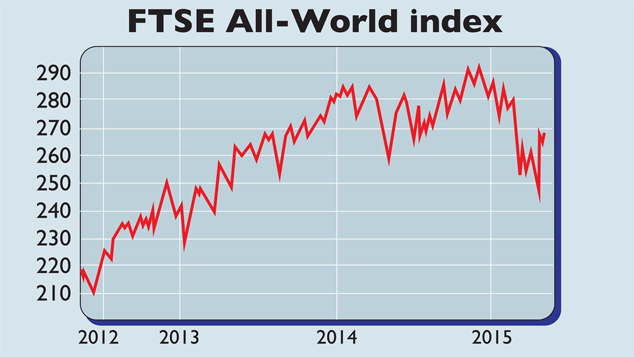Loose money lifts stocks
Global equity markets suffered their worst quarter in three years this summer. But the fourth quarter has got off to a strong start.

Get the latest financial news, insights and expert analysis from our award-winning MoneyWeek team, to help you understand what really matters when it comes to your finances.
You are now subscribed
Your newsletter sign-up was successful
Want to add more newsletters?

Twice daily
MoneyWeek
Get the latest financial news, insights and expert analysis from our award-winning MoneyWeek team, to help you understand what really matters when it comes to your finances.

Four times a week
Look After My Bills
Sign up to our free money-saving newsletter, filled with the latest news and expert advice to help you find the best tips and deals for managing your bills. Start saving today!

Global equity markets suffered their worst quarter in three years this summer. But the fourth quarter has got off to a strong start. The FTSE All-World index, which covers both emerging and developed markets, has bounced by around 10% this month. Can stocks keep going? This summer's swoon was caused by the prospect of higher interest rates in the world's biggest economy, America, and fears of a sharp downturn in China. But it now looks as though Chinese growth is due to bounce, while markets are not expecting the Federal Reserve to raise interest rates until March.
In the late summer, many investors had expected the Fed to move in September. But global jitters and some soft US data mean that dearer money has been postponed. That's good news for stocks, as liquidity lifts asset markets. "The chatter among the cognoscenti," says John Authers in the Financial Times, "is shifting from trying to guess the date of a rate rise to working out what new monetary measures might be available to the Fed to apply more stimulus." Some are pencilling in a fourth round of quantitative easing (QE), or money printing.
It's not just the Fed, notes Jesse Colombo on Forbes.com. The data from Europe have weakened recently and there is speculation that the European Central Bank could up the pace of its QE. The same applies to the Bank of Japan. So we're back to the "Goldilocks scenario", as Ralph Fogel of Fogel Neale puts it.Global growth is positive, but nowhere near strong enough to push central banks into tightening monetary policy.
MoneyWeek
Subscribe to MoneyWeek today and get your first six magazine issues absolutely FREE

Sign up to Money Morning
Don't miss the latest investment and personal finances news, market analysis, plus money-saving tips with our free twice-daily newsletter
Don't miss the latest investment and personal finances news, market analysis, plus money-saving tips with our free twice-daily newsletter
However, markets may be too complacent. Core inflation is now at 1.9% in America, the highest since July 2014. "It is clear that underlying inflation pressures are at worst stable and in all likelihood drifting higher," says Derek Halpenny of Bank of Tokyo-Mitsubishi UFJ. Meanwhile, earnings are set to dip in America, while elsewhere, too, "we are at that stage of the cycle when companies can no longer patch up earnings growth with cost-cutting, share buy-backs and other smoke and mirrors", says Fidelity's Tom Stevenson in The Sunday Telegraph. American stocks remain very expensive.
But for now, the mood is dovish, and as we've often pointed out, liquidity trumps fundamentals. We would continue to recommend sticking to the cheaper markets furthest away from monetary tightening: Europe and Japan.
Get the latest financial news, insights and expert analysis from our award-winning MoneyWeek team, to help you understand what really matters when it comes to your finances.

-
 How a ‘great view’ from your home can boost its value by 35%
How a ‘great view’ from your home can boost its value by 35%A house that comes with a picturesque backdrop could add tens of thousands of pounds to its asking price – but how does each region compare?
-
 What is a care fees annuity and how much does it cost?
What is a care fees annuity and how much does it cost?How we will be cared for in our later years – and how much we are willing to pay for it – are conversations best had as early as possible. One option to cover the cost is a care fees annuity. We look at the pros and cons.